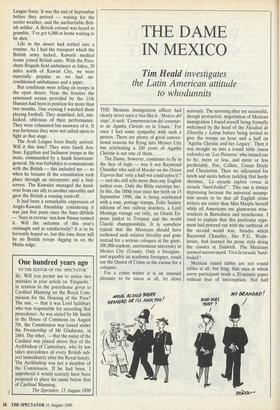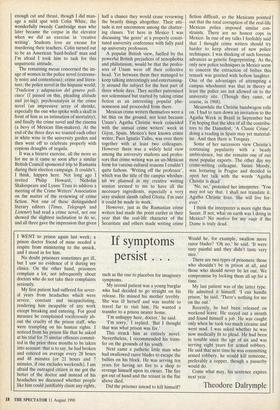THE DAME IN MEXICO
Tim Heald investigates Tim Heald investigates the Latin American attitude to whodunnits
THE Mexican immigration officer had clearly never seen a visa like it. 'Motivo del viaje' , it said: 'Comemoracion del centenar- io de Agatha Christie en la Unam.' For once I had some sympathy with such a person. There are plenty of good conven- tional reasons for flying into Mexico City but celebrating a 100 years of Agatha Christie is not one of them.
The Dame, however, continues to fly in the face of logic — was it not Raymond Chandler who said of Murder on the Orient Express that 'only a half-wit could solve it'? — and she still sells more than any English author ever. Only the Bible outstrips her. In this, the 100th year since her birth on 15 September 1990, she is being celebrated with a rose, postage stamps, Folio Society editions of two railway murders, a Lord Montagu vintage car rally, an Orient Ex- press junket to Torquay and the world Cluedo championships. It is somehow typical that the Mexicans should have eschewed such relative frivolity and gone instead for a serious coloquio at the giant, 300,000-student, autonomous university in Mexico City (Unam). Only a foreigner, and arguably an academic foreigner, could use the Queen of Crime as the excuse for a coloquio.
For a crime writer it is an unusual pleasure to be taken at all, let alone
seriously. The morning after my successful, though protracted, negotiation of Mexican immigration I found myself being formally welcomed by the head of the Facultad de Filosofia y Letras before being invited to give the troops an hour and a half on 'Agatha Christie and her Legacy'. Then it was straight on into a round table (mesa redondo) on 'Los Pioneros' who turned out to be, more or less, and more or less predictably, Poe, Collins, Conan Doyle and Chesterton. Then we adjourned for lunch and siesta before tackling that hardy chestnut, 'La escuela inglesa versus la escuela "hard-boiled"'. This one is always depressing because the universal assump- tion seems to be that all English crime writers are cosier than Miss Marple herself while all Americans are glamorous wise- crackers in Borsolinos and trenchcoats. I tried to explain that this particular argu- ment had petered out with the outbreak of the second world war, besides which Raymond Chandler, like P.G. Wode- house, had learned his prose style doing the classics at Dulwich. The Mexicans seemed unconvinced. Viva la escuela 'hard- boiled' 1
Mexican round tables are not round tables at all, but long, thin ones at which every participant reads a 20-minute paper without fear of interruption. Not half enough cut and thrust, though I did man- age a mild spat with Colin White, the wonderfully tweedy Cambridge man who later became the corpse in the elevator when we did an exercise in 'creative writing'. Students love an excuse for murdering their teachers. Colin turned out to be an American 'hard-boiled' man and I'm afraid I took him to task for this unpatriotic attitude.
The remaining mesas concerned the im- age of women in the police novel (extreme- ly noisy and contentious); crime and litera- ture; the police novel in the hispanic world; 'Tradition y adaptacion del genero poli- ciaco' (I passed on this, pleading altitude and jet-lag); psychoanalysis in the crime novel (an impressive array of shrinks, especially the one who spoke with a skull in front of him as an intimation of mortality); and finally the crime novel and the cinema (a bevy of Mexican film-makers). At the end of the three days we toasted each other in white wine in the university garden and then went off to celebrate properly with copious draughts of tequila.
It was a bizarre exercise, all the more so for me as it came so soon after a similar British Council sponsored trip to Rumania during their election campaign. It couldn't, I think, happen here. Not long ago I invited Philip Howard, Nicholas Shakespeare and Lynne Truss to address a meeting of the Crime Writers' Association on the matter of the reviewing of crime fiction. Not one of these distinguished literary editors (Times, Telegraph and Listener) had read a crime novel, not one showed the slightest inclination to do so, and all three gave the impression that given
half a chance they would cease reviewing the beastly things altogether. Their atti- tude is not uncommon among the chatter- ing classes. Yet here in Mexico I was discussing 'the genre' at a properly consti- tuted university conference with fully paid up university professors.
A popular British view, fuelled by the powerful British prejudices of xenophobia and philistinism, would be that the profes- sors of Unam were off their collective head. Yet between them they managed to keep talking interestingly and entertaining- ly around the subject for the best part of three whole days. They neither patronised nor solemnised but started by taking crime fiction as an interesting popular phe- nomenon and proceeded from there.
Mexican crime writers themselves were a bit thin on the ground, not least because Unam's Agatha Christie week coincided with the annual crime writers' week in Gijon, Spain. Mexico's best known crime writer, Paco Ignatio Taibo, was over there together with at least two colleagues. However there was a widely held view among the university students and profes- sors that crime writing was an un-Mexican form for various cultural reasons I couldn't quite fathom. 'Writing off the professor', which was the title of the campus whodun- nit we planned in my creative writing session seemed to me to have all the necessary ingredients, especially a very sexy student sleuth called Gloria. I'm sure it could be made to work.
However, just as the Rumanian crime writers had made the point earlier in their year that the real-life character of the Securitate and others made writing crime fiction difficult, so the Mexicans pointed out that the total corruption of the real-life Mexican police imposed similar con- straints. There are no honest cops in Mexico. In one of my talks I foolishly said that I thought crime writers should try harder to keep abreast of new police techniques. I was thinking of such forensic advances as genetic fingerprinting. As the, only new police techniques in Mexico seem to concern the extraction of bribes this remark was greeted with hollow laughter. One of the advantages of attempting a campus whodunnit was that in theory at least the police are not allowed on to the university site. (Though they came, of course, in 1968).
Meanwhile the Christie bandwagon rolls on. I had to turn down an invitation to the Agatha Week in Brazil in September but I'm hoping that the idea of all the contribu- tors to the Damefest, 'A Classic Crime', doing a reading in Spain may yet material- ise. And then there is Torquay.
Some of her successors view Christie's continuing popularity with a beady ambivalence, but she remains one of our most popular exports. The other day my crime-writing colleague, Susan Moody, was lecturing in Prague and decided to open her talk with the words 'Agatha Christie is dead'.
'No, no,' protested her interpreter. 'You may not say that. I shall not translate it. Agatha Christie lives. She will live for- ever.'
I think the interpreter is more right than Susan. If not, what on earth was I doing in Mexico? No motivo for my viaje if the Dame is truly dead.











































 Previous page
Previous page